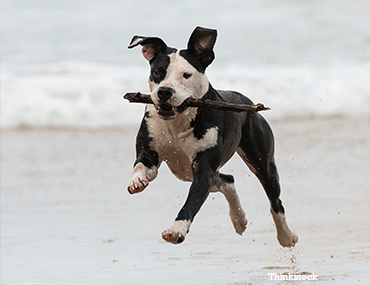Are you thinking about adding a pit bull to your family? Owning a pit bull can be a very rewarding experience. From their eager-to-please demeanor to their loyal and affectionate natures, pit bulls capture the hearts of dog owners around the world.
Here are five important considerations to make before deciding if a pit bull is right for your home.
Pit bulls come in many packages.
The moniker “pit bull” is a category, rather than a breed, and refers to a variety of dog pedigrees. That means pit bulls range in size. Breeds such as American Staffordshire Terrier, Staffordshire Bull Terrier, and Cane Corso mixes weigh in the 30-40 lb. range, while mastiff mixes can weigh well over 100 lbs. As mentioned above, the average pit bull weighs in around 55-60 lbs.
With this in mind, it is possible to choose a breed that fits your size requirements. They are all generally strong, tenacious, and loyal dogs who need an owner with experience and one who is ready to lead firmly and with lots of love. Also, some pitt bulls aren’t great multi-pet household dogs; they may object to other dogs or cats. However, this is not a hard-and-fast rule, just something to be aware of.

Many pit bulls are very athletic and have lots of energy to burn.
If you think the muscular, sleek appearance of pit bulls indicates superior athleticism, you’re right. Most pit bulls are very athletic and have a lot of energy. If you’re active and love to get outside, pit bulls can make great companions on runs, hikes, swims, and other outdoor activities.
Pit bulls are affable and enthusiastic companions.
Pit bulls can be especially friendly and enthusiastic. In fact, many tend to act like lap dogs, and average pit bulls weigh between 55 and 60 pounds! This is great, but considering their size, sometimes their vigor can overwhelm very young children and older people.
Pit bulls are primarily house dogs.
One great aspect of pit bulls is the fact that they have short coats and don’t shed much. Obviously, this is ideal if you aren’t interested in dealing with a house covered in fur. However, it also means that pit bulls are primarily house dogs. Because they don’t fare as well in colder climates compared to fluffier dogs such as Siberian huskies and golden retrievers, they shouldn’t be left outside for extended periods of time.
Social Stigma
If you’re considering owning a pit bull, you might need to have thick skin. There are several stereotypes about pit bulls that contribute to a substantial social stigma concerning pit bull owners.
- Many people view pit bulls as the quintessential guard dog – intimidating, aggressive, and mean.
- Pit bulls are associated with crime and illegal activity.
Because of these stereotypes, pit bull owners have to deal with a certain level of scrutiny as to the training and control of their pets. What most people see in their pit bulls – loving, cheerful goofballs with lots of disposable energy—is not necessarily what the general public sees.
Some social stigmas attached to pit bull owners include:
- Many people generalize about the demographic of pit bull owners as violent criminals running drugs and using their pit bulls to guard illegal operations or to earn them an extra buck in illegal dog fighting rings.
- Pit bull owners sometimes hear negative comments from neighbors, co-workers, and even perfect strangers.
- Owning a pit bull can make it harder to find living accommodations, especially if renting. Also, some insurance companies will not insure a household with a pit bull or a dog that “looks” like a pit bull.
- Some towns have laws against owning specific breeds of pit bull.
Pit bulls can be incredibly rewarding pets – just ask their owners! Just make sure that you are fully prepared and informed before you decide to make the leap and add a pit bull to your family.
If you have any questions or concerns, you should always visit or call your veterinarian – they are your best resource to ensure the health and well-being of your pets.
